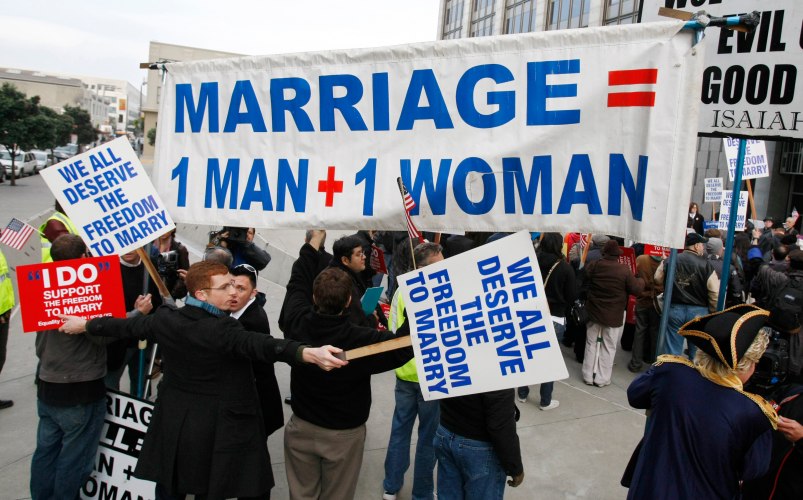The state of Kentucky is now defending its right to prohibit same-sex marriage with an unconventional stance: Procreation, the purview of heterosexual couples, is good for the economy, so the state has an obligation to ban gay marriage.
Lawyers for the state filed a brief last week after a federal judge ruled it must recognize gay marriages from other states. The lawyers argued opposite-sex married couples recoup the state for the tax benefits they recieve by procreating and thereby improving the state’s economy. Same-sex couples, they argued, do not.
“Same-sex couples are materially different from traditional man-woman couples. Only man-woman couples can naturally procreate,” the lawyers wrote. “Fostering procreation serves a legitimate economic interest that is rationally related to the traditional man-woman marriage model.
The brief, first reported by the Louisville Courier-Journal, was filed as part of the state’s appeal of the federal judge’s decision. Kentucky Attorney General Jack Conway (D) declined to appeal the ruling, so Gov. Steve Beshear (D) hired private lawyers to pursue a challenge.
After first arguing that Kentucky had “a basic and fundamental interest in ensuring the existence of the human race” through procreative opposite-sex marriages, the lawyers took things a step further.
“The Commonwealth, however, has an additional interest in promoting procreation — supporting long-term economic stability through stable birth rates,” they wrote.
They then cited research showing that stable birth rates are economically beneficial and international examples of countries encouraging procreation to combat declining birth rates. That was fit into their argument against same-sex marriage.
“Kentucky has an economic interest in procreation,” they said. “Just as governments around the globe promote procreation and birth rates, so does Kentucky’s traditional marriage policy.”
The state’s lawyers then invoked the tax benefits that married couples are granted. Opposite-sex couples offset those costs through their improvement of the long-term economy, but same-sex couples don’t.
“Though there is a cost to Kentucky by granting tax and other benefits to man-woman couples, a stable or growing birth rate offsets the cost,” they wrote. “Only man-woman relationships can naturally procreate, and only those relationships, therefore, are afforded the state sponsored benefit.”
“The Plaintiff, however, seek the same tax and other benefits without furthering Kentucky’s legitimate and vital economic interest. Kentucky’s support of the only type of relationship that can naturally procreate — traditional man-woman couples — by only recognizing traditional marriage is not only rational, but also consistent with sound economic policy.”







Yes. It’s true. If we make gay marriage legal then everyone will want to get gay married instead of straight married and then no one will have kids.
Face, meet palm.
So let me see if I get this argument. If we allow gay people to get married opposite sex couples will stop marrying and having children. Is this your argument?
If marriage is about procreation then we must forbid people from marrying infertile members of the opposite sex, no?
Does this also mean that older people who are no longer procreating need to get the hell out of Kentucky because they’re just worthless?
Why would any attorney put forth such a primitive and absurd argument?
Nail head,meet hammer.